
a treasure-trove of literature
treasure found hidden with no evidence of ownership
(and our other authors) or get HELP Reading, Downloading and Converting files)
or
SEARCH the entire site with Google Site Search
 |
Project Gutenberg
Australia a treasure-trove of literature treasure found hidden with no evidence of ownership |
BROWSE the site for other works by this author (and our other authors) or get HELP Reading, Downloading and Converting files) or SEARCH the entire site with Google Site Search |
Title: All Among the Fairies
Author: Ethel Jackson Morris
eBook No.: 2100081h.html
Language: English
Date first posted: 2021
Most recent update: 2021
This eBook was produced by: Walter Moore
by
Ethel Jackson Morris



The Fairies
The Rose
Queen Ella
An Ambitious Pair
The Maker Of Troubles

You thought all the fairies dead, you say,
Gone from this beautiful world so gay;
Lying asleep on a lost moonbeam,
Or carried away by a sparkling stream.
How silly to think the fairies die!
They are always somewhere dancing by,
Gliding here and whirling there,
Swiftly moving on little feet bare.
They float along on the gentle breeze,
That softly stirs the whispering trees;
They wander dreamily to and fro,
Past where the woodland waters flow.
The willow trees by the lonely creek,
The tall grey gums on the mountain peak,
Welcome them all as they dance along,
Tripping it lightly to Bellbird’s song.
When told of fairies, don’t shake your head,
And say that you know they all are dead;
For although the years glide swiftly by,
The sweet little fairies never die.
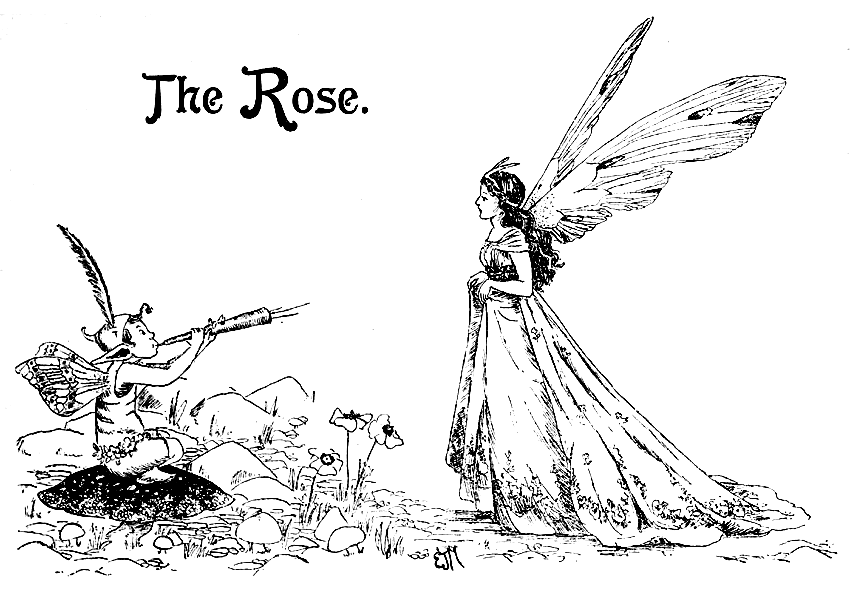
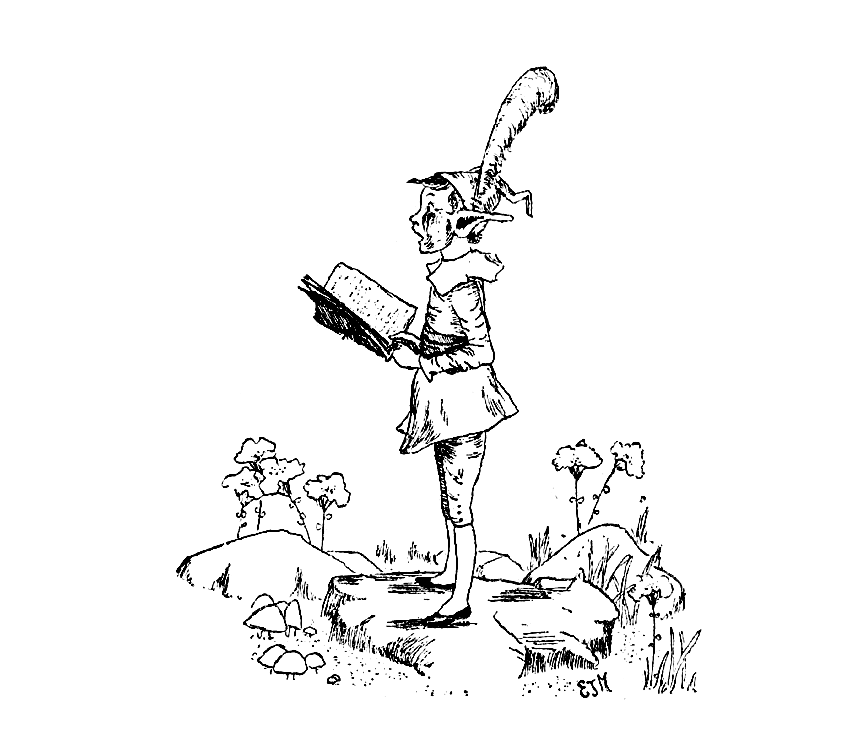
Oh! how lovely it is,” sighed Anna; “If I could only get into it,” and the little girl clasped the flower closer and sighed again. She was sitting on the garden seat with a large rose in her hand, while the other flowers she had gathered lay unheeded on the ground.
“See,” went on the child, unconsciously speaking aloud, “See how the dew has weighed down its beautiful head; the cup is filled, and its petals are glistening and wet. I am sure,” she murmured, “it is weeping for the dear little buds it has left on the tree where it grew. It is certainly the queen of all flowers,” she added, nodding her little head wisely, “but I wonder how it came to be called the queen.”
“Well, you are ignorant if you don’t know that,” said a voice beside her; “it’s certainly a thing you ought to know.” Anna started, but looking down she saw a tiny elf gazing up at her, with wide open eyes.
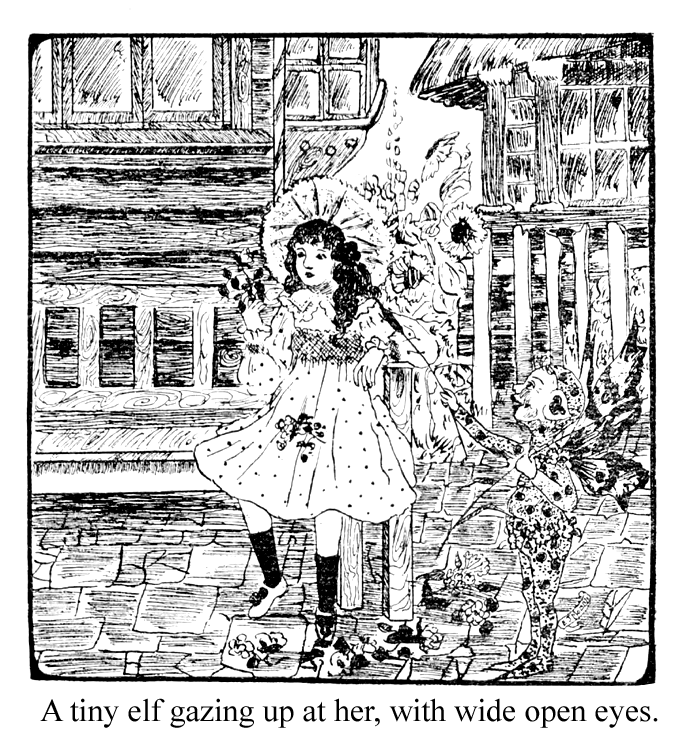
“Do you really know?” she asked, with a world of wonder shining in her eyes. “You must be very wise.”
“Oh, well, I know a good deal, because I’m a fairy,” he said, drawing himself up proudly.
“And do fairies know such a lot?”
“Of course,” he said, glancing at her scornfully.
“Well, don’t get cross and horrid, but tell me about it instead,” said Anna.
“Very well, I will tell you the story if you promise me you won’t interrupt and ask questions.”
“Oh, yes, I will promise; do begin at once.” So the elf began:
“Once, many years ago, there was a beautiful garden situated on the borders of a great forest. It was in this garden that the fairies lived. Now, in the garden there grew all kinds of flowers, and the Crown Imperial lily claimed that she was the most beautiful of all. ‘I am the fairest flower,’ the stately blossom would cry, and the rest would repeat, ‘Thou art by far the fairest.’ Now, when the great moon shone over the sleeping world, the fays, fairies and the woodland sprites would come from their mushroom homes and go dancing and singing among the flowers, the Fairy Queen touching them each with her magic wand as they passed, leaving in their hands a glistening dewdrop, which served as a lantern. Then, when they had all received the dewdrops, they would troop along to the great oak tree where they held their councils. One night, when they were all assembled beneath the tree, the Queen stood up to command silence, and then told them she had something important to communicate.
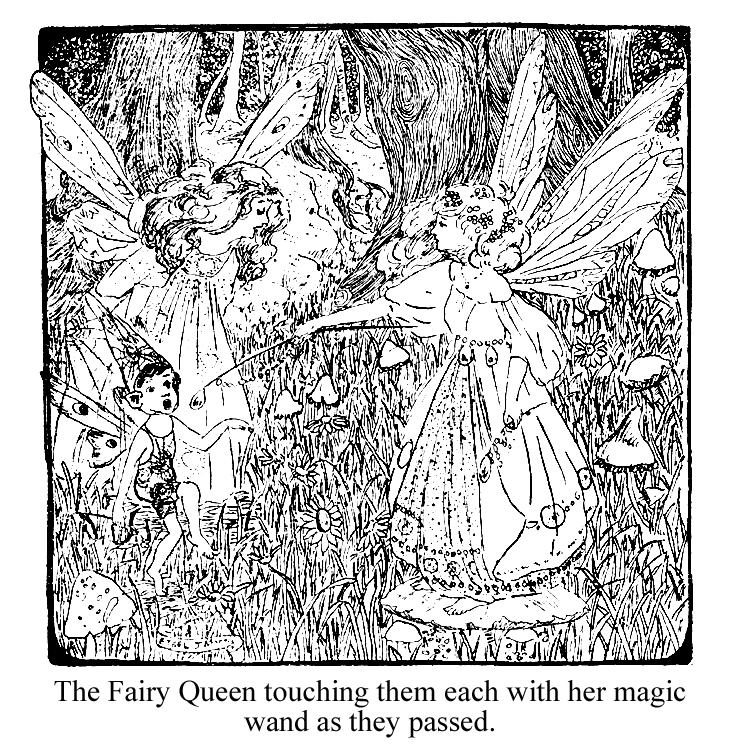
“‘Are all my subjects here?’ she asked.
“‘All,’ came the answer from many throats.
“‘Then call Merlin, the court magician.’
“‘Yes, your Majesty,’ said he, stepping forward, ‘I am here.’
“‘I find,’ said the Queen, ‘that the Crown Imperial lily, of our beautiful garden, considers herself the fairest and the best; therefore I have decided to put all these flowers to a test, and that which passes shall be the queen of flowers henceforth. That is all I have to say, Merlin. Go; deliver my message to the flowers at once.’
“‘Your Majesty is obeyed,’ replied Merlin, as he disappeared.
“‘Now to the dance,’ cried the Queen.
“And, oh! how they danced,” said the little elfman: “up and down, in and out, till they seemed just a whirl of glittering colours. But when the first streak of dawn appeared, the fairies, outspreading their golden wings, flew away. The flowers were greatly excited when they heard about the test, and they waved and danced in the breeze, bowing and bending as though their stalks would break. The next day there came to the garden a beautiful maiden, clad in glistening gold, with large shimmering gold wings. Her eyes were blue and sparkling, and in her hair was fastened a beautiful crown of little pink roses and pearly dewdrops. She walked proudly around the garden surveying the flowers. Then, seeing the Crown Imperial lily she said sweetly: ‘May I shelter under your leaves?’ and her voice was like a song. ‘Most certainly,’ answered the lily, ‘for I am the fairest of all flowers; the whitest and the best.’
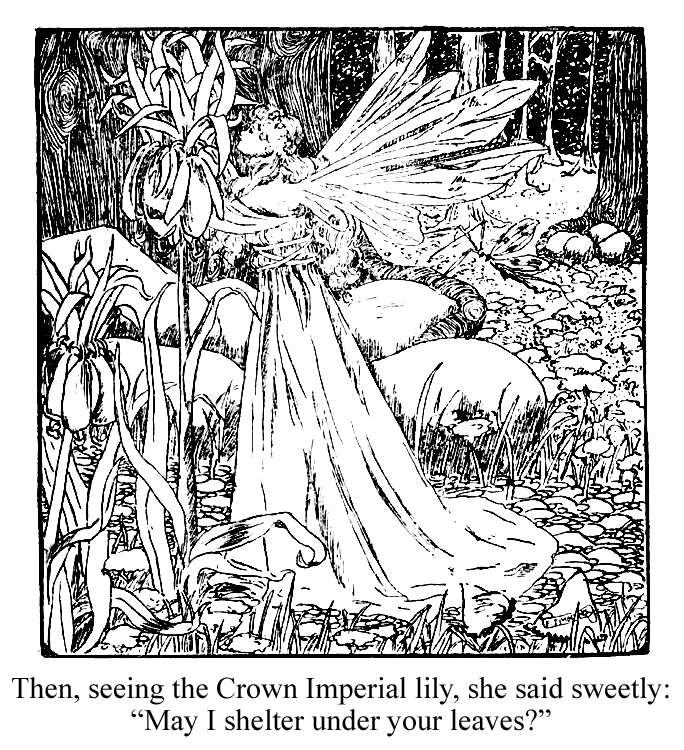
“The following day was wet and stormy, and through the garden came a little beggar maid, and her little bare feet were blue with the cold. She went from flower to flower and begged pityingly for shelter which they all refused with the cruel words: ‘We have no shelter for such as you.’ At last she came to a small rose bush, and asked despairingly for shelter, which the humble rose willingly gave.
“In the morning, when the rose awoke, she found that the child was gone, but all the ground around her roots was carefully dug up. That afternoon, the Queen came and told the flowers that the test was over, and had been won by the rose. She then told them that she was the beautiful maiden and also the little beggar child.
“Then the Queen turned to the rose and said that she would grant her any one wish. The rose lifted up her head and said:
“‘Oh, your Majesty, grant that I may become a fairy child, and go forth into the world to help those in trouble.’
“‘Your wish is granted,’ said the Queen, ‘and henceforth you shall be known to the world as Charity; and not only will I grant your wish, but all the rose trees that grow hereafter shall bear beautiful blossoms, and will hold the first place among flowers, and, therefore, the rose will be for evermore the queen of flowers.’” Here the elf-man stopped.
“Oh, is that all?” exclaimed Anna; but strange to relate, there was no sign of the tiny being.
* * * * * * * *
“Yes,” nurse said, “it was all a dream, and Miss Anna must certainly have gone to sleep in the garden.” But Anna did not agree, for the little girl knew better— yes, far, far better—than nurse, for once.



The hall clock struck six chimes with stately measure, the sixth stroke dying away like a distant echo in some gloomy cave. Ella started up, and, opening her window, looked out. She sought for her friend the sea; to-day it looked beautiful, as it sparkled in the sun. Quickly dressing, she ran down to the beach, and seating herself on a large stone she gazed thoughtfully out to sea. She was a lonely little maiden, for her mother and father were dead, and she lived with her Aunt, who was very old and quarrelsome, and who did not understand her ways or childish pleasures. As she sat there she could see the little fishing boats coming from their midnight voyages, and could hear the low murmur of the waves as they broke one by one upon the shore, with a sound like very soft laughter.
“Good morning, Missie,” said old Bob, the fisherman, as he came along with his fishing net. “You will not come to see the fish caught this morning, I suppose?” he added, smiling, (for some weeks ago Ella had asked him to let her watch him draw his net ashore, and she had told him that she thought it would be great fun to watch the fish come inside it from the sea; but when the little leaping things were lying upon the sand she wanted to put them back into the sea again.)
“Oh, no, Bob,” cried Ella, “I do want to come, and I hope you will catch many to-day. I feel so sorry for them, I wish I could put them back again and let them swim away.”
“Why, Missie,” said Bob, “what would all the people do if fishermen were like you?”
“Well, good-bye, Bob,” said Ella, as the old fellow walked away; “I hope you will not catch too many.” Ella sat and watched the little curling waves break upon the shore, and it seemed to her dreamy fancy that they were calling to her, and that their white arms beckoned as they lapped gently back with the receding tide, leaving behind them countless tiny furrows in the silver sand.
“Oh, my little waves, if I could go with you!” she cried, standing up and stretching forth her hands. “Oh, dear little waves, do take me with you as you go back with the tide.” Then one little wave bolder than the rest came swiftly forward and broke around her feet with a hushing murmur, then returned again with a sobbing sound, as if it regretted to leave her.
“I shall go to the haunted cave tonight,” murmured Ella, as if speaking to the sea, “and see the beautiful maiden who is said to go there every night; and I shall ask her to take me away with her, for no one will grieve for me, and Auntie does not love me,” she added sadly. That night she slipped out unobserved, and ran down to the beach and crept into the cave. There she waited behind a great piece of rock, for what seemed to her a very long time. The air was still and quiet, and no sound broke the stillness save the wash of the water as the tiny wavelets broke one after another on the beach.
“Oh, will she never come?” cried the weary little maiden. Stay—what was that? —only a loose stone from above falling with a sullen sound on the rocks below. Two seagulls startled, flew screaming out into the night, and all was quiet again. Suddenly a bright light sparkled out across the water, shining straight into the cave. So bright was it that it hurt her eyes to look upon it. Now it came nearer, and Ella saw floating towards her a little boat with a silver sail, in which sat a beautiful maiden. Nearer and nearer it came, and the intense stillness was broken by the maiden’s sweet singing, which floated across the water and echoed through the cave. While Ella waited, the voice suddenly ceased, and there was the sharp grating of a keel on the beach. Having drawn the boat up high upon the sand, the maiden came slowly forward and entered the cave. Ella drew further back into the shadow and watched her. She glided slowly forward—her white garments swaying musically as she walked—then she leaned wearily against a large piece of rock in the centre of the cave. Presently she began to sing, in a round, full voice, that rang through the air with the clearness of a silver bell. The sweet notes were full of melody, but mournful and pathetic.

Little Ella was enchanted, and, as she listened, her heart grew soft and full of tenderness for the beautiful singer.
Such a wondrous song it was, full of sadness.
She sang of the beautiful world, so full of joy, of the fairies that live in the woodlands, of the mermaids and merbabies under the sea, and of the little water-babies in the river. She sang of the happiness of these little beings, and how she herself was so sad because they had no queen to rule over them, and how she came every night to the cave in hopes of finding some little earth maiden who would go and watch over them.
“I will go with her,” thought Ella, as she listened, “and I will ask her to take me to the little water-babies.”
When she ceased, Ella stole softly up and took her hand. “I will come,” was all she said; but the maiden understood, and, taking the child by the hand, she led her to the boat, telling her softly to step in. Then the maiden pushed the little craft out into the water, which was received by the waves and borne gently along.
“Won’t you come too?” cried Ella, from the water, to the fair maiden, who was still standing on the shore. “Have I to go alone?”
“Yes, alone,” she answered; “all alone to the ‘Sunset Lake,’ for now my work is done, and I return once more to my home in the land of dreamful sleep. So good-bye, little queen, good-bye.”
The last words died away in a whisper, and at that moment a sigh seemed to fill the soft night air, and Ella was alone, whilst far out on the water she saw a large, crimson poppy floating away on its surface.
The little boat swung out with the tide, and Ella was borne swiftly and silently along, she knew not whither. On and on they went, leaving the lights of the little fishing village far behind them. At last Ella saw they were approaching the mouth of a large, gloomy cave. The water flowed sluggishly in, bearing the little boat with it. The splash of the waves, made by the moving of the boat, seemed to echo gloomily through the cave.
Ella began to feel afraid as they went swiftly on, and there was no sign of a light, nothing but total darkness; but suddenly, as they rounded a corner, Ella uttered a cry of amazement, for there she saw, stretching far away, the beautiful “Sunset Lake.”
The sun was just sinking in the west as the little boat shot out of the cave, ruffling the water of the placid lake before it, and presently, with a little sighing sound, it ran ashore in a maze of golden flowers by the bank.
As Ella stepped out of the boat, she was more surprised than ever at the beauty of the scene around her. The glorious sunset lighting up the sky with crimson, gold, and quivering opal; the clear, still lake, reflecting the beautiful colour of the sky, was all aglow. The air was still and quiet, for all the little birds had gone to rest, and no sound broke the stillness, save the mournful plash of the wavelets rolling the whole length of the shore. Far away on the water Ella could see the little boat, with its silver sail, like pale moonlight, floating down the shimmering waters to the spot where the sun was just dropping into the lake. She stood and watched it till it was lost to view in the haze of golden light.
What should she do? She stood awhile pondering, and having made up her mind, she turned and walked slowly along the shore.
As far as she could see was beautiful silver sand, and dotted about, right to the water’s edge, were little clumps of flowers, while further back the sand lost itself in the depths of a beautiful wood. Ella entered it and was amazed at its splendour.
All around her were large trees, some with their beautiful foliage touching the ground. Her footsteps fell noiselessly on a thick carpet of velvety green moss, dotted prettily here and there with snow-white flowers, and the red gleam of ripening wild strawberries. Ella pushed through the tangled bushes and came suddenly upon a beautiful fairy seated on a stone, decorating a silver trumpet with some of the flowers that grew around her.

Far away behind her stretched another part of the sunset lake. Ella was so astonished that she could do nothing but stand and gaze.
“Who are you?” said the fairy, looking up from her work, “and what do you want?”
“I have come,” answered Ella, “to stay with the little water-babies, and—”
“Oh!” cried the fairy, jumping up, “you have come to be the queen, and rule over our little water-babies. I have been expecting you. Come along, and I will get you ready at once.”
She then led Ella down a little pathway of stones to the edge of the lake. Far out over the water Ella saw a beautiful city built of pure crystal. Domes, towers and steeples stood out against the sky, and the red gleam of the sunset, shining through the crystal, enveloped it in a golden haze. The castles and shining domes glimmered and shimmered, casting a glow of fire over the water.
“What is that?” cried Ella, delightedly.
“That,” answered the fairy, “is the City of Sleep, where Zerina lives.”
“And who is Zerina?” asked Ella.
“Zerina is the maiden you saw in the cave,” replied the fairy; “but come, let us be going.”
The fairy then drew out a tiny boat from among the rushes, and set it afloat on the water. When they were seated, the little craft began to move slowly along. Ella sat enchanted with the beauty of the scene around her. Suddenly she became aware that the boat was anchored, and the fairy was speaking to her.
“Come, Ella,” she said, “jump into the lake.” Ella could not swim, but she threw herself obediently into the water, and the fairy sprang in after her.
When she opened her eyes, she was surprised to find herself in a most resplendent hall. The floor was covered with soft, white sand that gleamed like moonlight. The roof was supported by coral pillars, and the walls were made of strange coloured stones and metals, and over it all the light shone in tender quivering rays. Then the fairy led her up a winding stairway into a little room made of mother-of-pearl.
“Now, little maiden,” she said, “I am going to turn you into a little water queen.” She then took a flower from her trumpet, and waved it over Ella’s head. The flower seemed to unfold as she waved it, enveloping Ella in a gauzy mist. Then she took some gold pollen from another flower, and threw it into the air, making the mist clear instantly, and Ella stood before her arrayed in queenly robes.
Her dress was a pale pink colour, with a silver ribbon encircling her waist, her black hair was long and shining, and on her head was a garland of pure white waterlilies.
“Now, Ella,” said the fairy, as she kissed her, “shut your eyes,” and then—well, what had happened?
The fairy had gone, and Ella found herself standing on a stone in a little river that flowed slowly along, to lose itself in the Sunset Lake. All along its banks were trees and beautiful flowers. Ella sat down on a stone and gazed in bewilderment.
Suddenly, from every quarter of the stream, came a crowd of little children swimming up. Some had little curling tails, some wore garlands of flowers, and some had red strings of corals round their necks and arms, others blew on crooked shells, and many of the children, with hugs and kisses, hung on her neck and shoulders, murmuring softly: “Our little queen! our little queen!”
Ella was enchanted with the little beings, and she kissed and caressed them in return.
Then they began to play with one another, jumping high out of the water, laughing and singing all the time.
Ella stood and watched them, and, after a time, joined in their sport.
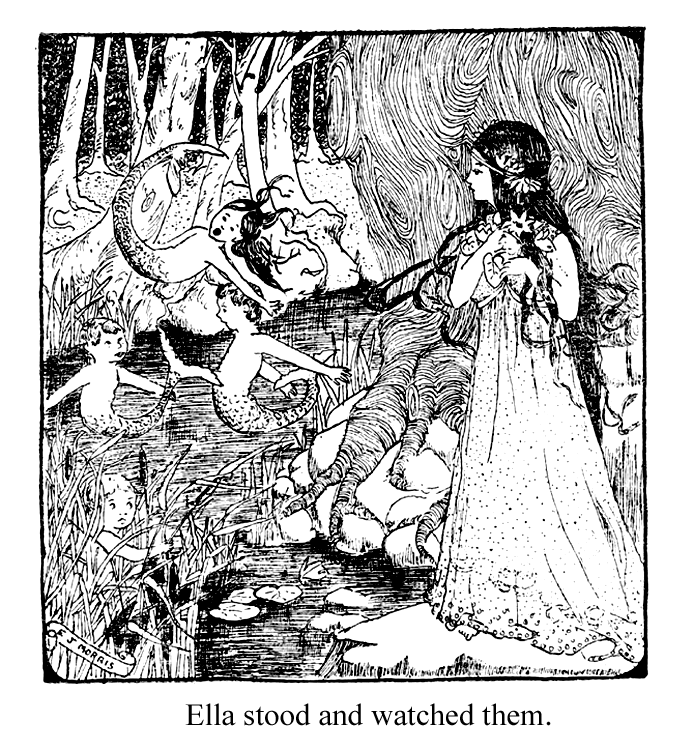
They played, sang, and swam about till long after the great moon had taken the place of the setting sun; but when the first streaks of dawn appeared, all grew quiet, and they floated silently away on the River of Dreams to the “City of Sleep.”
Day came, and the wonderful mysteries of the sunset and moonlight vanished.
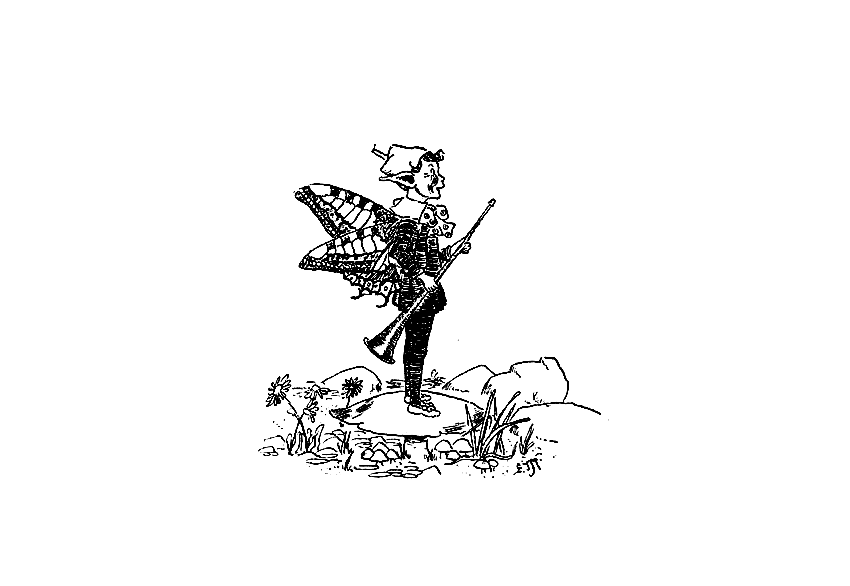
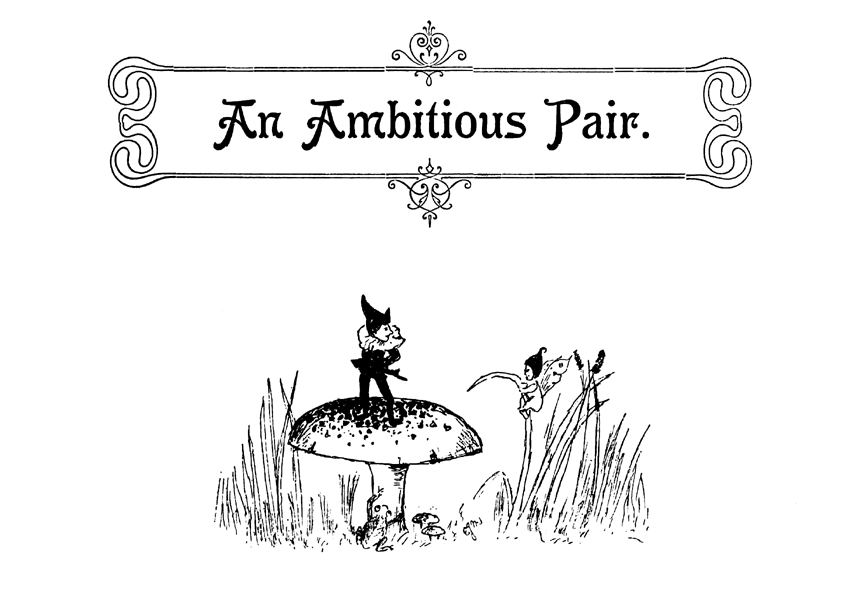
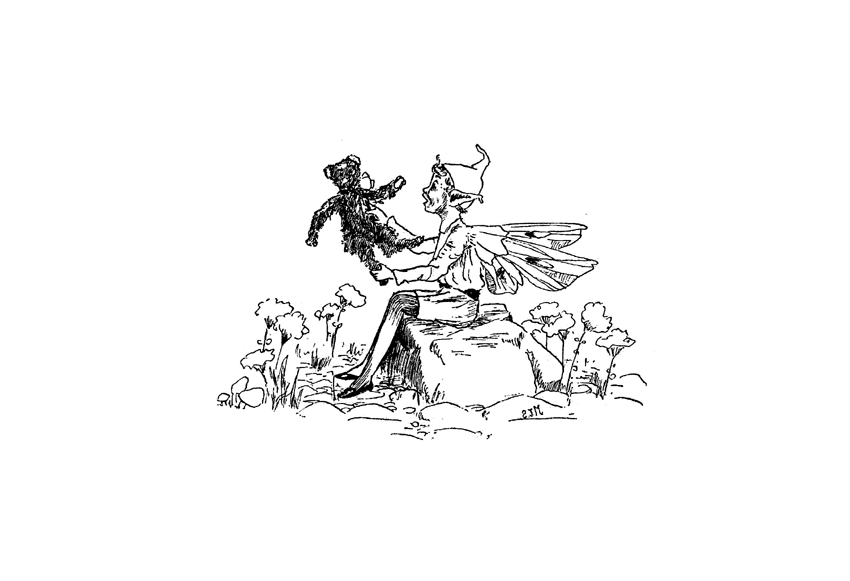
Far away in the forest, where the fairies, the elves, and the hobgoblins dwell, lived two little gnomes. Their home was under a large mushroom, and their names were Hip and Hop respectively.
They were very fond of adventure, and, in fact, were in the habit of saying to one another: “When shall we start to seek our fortune?”
They were really very ambitious, and looked forward to the time when they should set out on their travels to find some hidden treasure, or to rush bravely to the rescue of any fair maiden, whom they might find imprisoned in a great castle.
Some years before the time that my story begins, there was a great tumult in fairyland, for it was discovered that the beautiful princess of a neighbouring tribe of wingless fairies had completely disappeared.
The two tribes were on very friendly terms; so, of course, the grief on both sides was very great. However, the princess had never come back, and the general belief was that she had been spirited away by the forest witch, a tiresome old thing who raced about on a broomstick, and whom the princess had upset one day, just as she was alighting on the ground.
From the day that the princess disappeared, the witch had changed her abode, which she had hitherto held in a large cavern, and the fairies had never seen her or the princess since.
Now, this happened many years before the beginning of my story, and the two little gnomes had often talked it over, but had never found the solution of the mystery.
One day, as they were walking through the forest, the question of the lost princess arose, and together they sat down on the trunk of a fallen tree and discussed it.
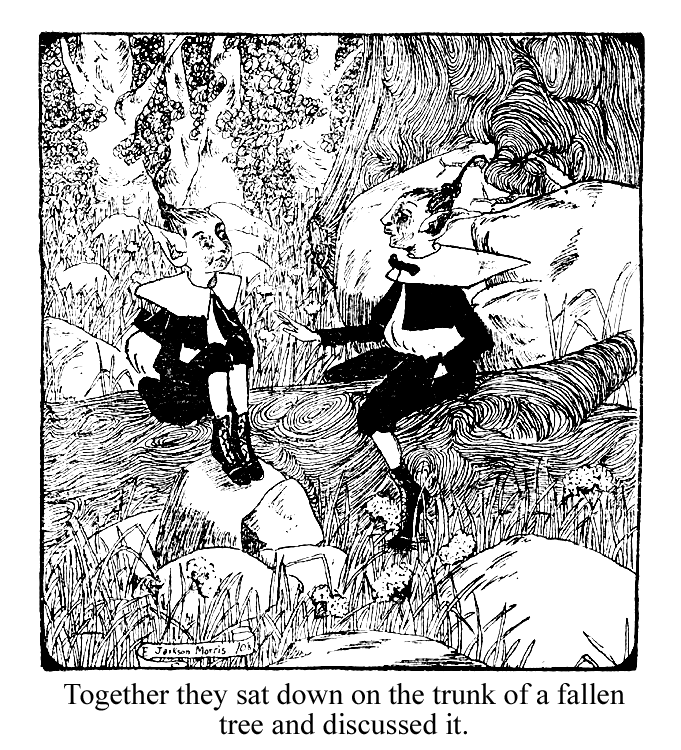
Hip began telling his plan; but, as Hop had heard it so many times before, he did not listen very attentively, and occupied himself with his thoughts, when all at once a brilliant thought came into his head.
“I say, do listen!” he cried, suddenly, interrupting Hip in the middle of his narrative, “I have a splendid plan. Let us set out to seek the lost princess ourselves.”
“The very thing,” cried Hip; “I wonder we did not think of it before. We had better start at once.”
“Yes, I think we should,” answered Hop; “which way ought we to go?”
“Well, I don’t know,” replied Hip, “but I propose we should go straight ahead, and we will be sure to find something.”
“Well, agreed,” cried Hop, and off they started. Up hill and down dale they went, till they had left the fairy forest far behind. At last they found themselves on a huge, sandy plain, across which ran a narrow track, leading to a dark forest.
Arriving there, they sat down and rested awhile, quenching their thirst at the brink of a little stream, which lost itself in the depths of the forest. Much refreshed, they pursued their journey, following the little track, which wound on and on.
The way led through a dark, thick wood, and continued so for a number of miles; then the road led up a steep and bare hillside. At last they reached the top, and there below, at their feet, they saw, stretching far away, a beautiful forest.
The great sun was just sinking in the west as Hip and Hop made their way down the hillside. The whole sky was lit up with its gorgeous light—azure, crimson and gold.
They picked their way among the trees and, finding a beautiful grassy space, they lay down to rest. The air was still and quiet, for all the birds had gone to rest, and no sound broke the silence.
“Oh! isn’t this lovely?” cried Hip, “it is almost as lovely as our own beautiful forest, all these beautiful trees and sweet-scented flowers, and not a sound to break the silence.”
Hardly had he finished speaking when the sound of sweet singing reached their ears. Springing to their feet, they stood listening to catch every word.
“Who can it be?” whispered Hop, as the singing became louder and sweeter, as it was borne along on the evening air.
“Come, let us find it,” shouted Hip, and off he went, with Hop running behind.
“What is it?” cried Hop, as he came hurrying up.
“Look! look! isn’t she lovely?” cried Hip, as he peeped through the bushes which hid her from view.
“Let me have a look, too,” said Hop. “Oh!” cried he, the next minute, “she’s just beautiful. Come, let us go to her.” They pushed through the tangled bushes and came to an open space, where a beautiful maiden sat, singing sweetly as she plucked and kissed the flowers that grew about her.
“Well, little elves,” she said, as she gazed at them, “what is it you want?” Hip looked at Hop and Hop looked at Hip, but neither could speak.
“I—er—at least, we—we came,” began Hip, but could get no further.
“Well,” said Hop, looking round for help from the almost dumb Hip, “The—er —the fact is—”
“Yes,” said the beautiful maiden, looking inquiringly at him, “is what?”
“It is—it is—Oh! I don’t know, I don’t know.”
“Oh! Hip, let us go away at once,” cried the poor little gnome, starting to run away.
“Not so fast, not so fast, my little friends,” said the maiden, “I think I know what you want. You are seeking the lost princess.”
“Yes, yes, that’s it,” they cried, both in the same breath, “that’s it, we are seeking the lost princess, who disappeared at the same time that the witch left her home, and neither have been heard of since,” they added, mysteriously, having quite recovered their tongues. “And,” said Hip, growing quite confidential, “we think that she stole her, and that she has gone away and taken her too, and that she—”
“Why, who is she?” asked the maiden, smiling.
“Why, the witch, of course, and that she is chained in a great castle,” continued Hip, growing quite excited, “and that if we do not rescue her, she will—”
“Come,” interrupted Hop, thinking his friend had said quite enough, “don’t talk any more, for the beautiful lady knows all about it—don’t you?” he said, gazing inquiringly up at her.
“Yes, my little elves, I know all about it.”
“Then help us, pretty lady,” said Hip. “Help us to find what we seek.”
“Yes, certainly, I will help you,” she answered; “but why are you seeking her?”
“Well,” said Hop, “we wanted to go on a journey and win honours for ourselves, as other gnomes have done, and to show some little elves, who were rude to us and called us cowards, that we would become famous throughout Fairyland.”
They then explained to their companion all they knew about the princess, and their theories on the subject.
“Well,” said their new friend, “I think I can help you a little.”
“How?” asked Hip and Hop, in the same breath.
“First find the track, then the tree, and then the Princess. Now, that is all I can tell you,” and, with a merry laugh, she bounded up a mossy bank, and was lost to view.
The twilight had just faded into night as our two friends started off.
“Look, Hip,” cried Hop, “look at that light over there on the grass,” and there, sure enough, something sparkled on the ground, and the longer they looked at it the plainer they saw that a long line of twinkling lights stretched across the grass. With beating hearts, they rushed towards it. Hip stretched out his hand and touched them.
“Why, they’re only dewdrops,” he said, “but who ever saw them lying in a line like that.”
“Let’s see where it goes,” cried Hop, “for it may have something to do with the Princess.”
Off they started along the track, which lost itself in the distance. On and on they went, till, suddenly, when turning a corner, they saw that the line ended in something white.
“Look, look!” whispered Hip, as he drew nearer, “why it’s a skinny white rabbit.”
“So it is,” said Hop, “and, look, it is brushing away the dewdrops.”
As soon as the rabbit caught sight of them he bounded away with the two little gnomes after him. But fast though they ran, they could not catch him; and, just as they were gaining, he stopped at the foot of a large stone, looked around at them, and disappeared.
“Well,” said Hip as they came up, “he disappeared here, so he’ll come out here, and I shall just wait here till he comes.”
“So shall I,” said Hop; “but I think we ought to hide behind one of these boulders.”
“Yes, I think so, too,” said Hip; and climbing behind one of the rocks which lay around, they awaited events.
They had scarcely been waiting a minute when they saw the rabbit’s head emerge from the hole, and, seeing no sign of our heroes, he jumped up and scampered away, with Hip and Hop dashing wildly after him. He ran along for some distance, then disappeared behind a large oak.
“Well,” said Hip, as they came up, “he’s gone again.”
“Look, look!” cried Hop, “look at that door.” And there sure enough was a door fitted beautifully into the side of the oak.
“I can’t see anything,” cried Hop, as he peeped through the keyhole; “and the door is locked, too.”
“Let me see if the key is on the inside,” said Hop, as he advanced with a long reed in his hand. He probed the keyhole, but the reed went right through. “Well,” said he, “there is no key in the lock, so I think it is likely to have been locked from the outside.”
“Yes, perhaps so,” said Hip; “so come and let us hide behind these rocks and see what happens.”
The time dragged slowly on, and still no sign of anything. At last, just when the first streak of dawn appeared, they saw coming towards them an old decrepit-looking woman, holding by the paw their enemy the white rabbit.
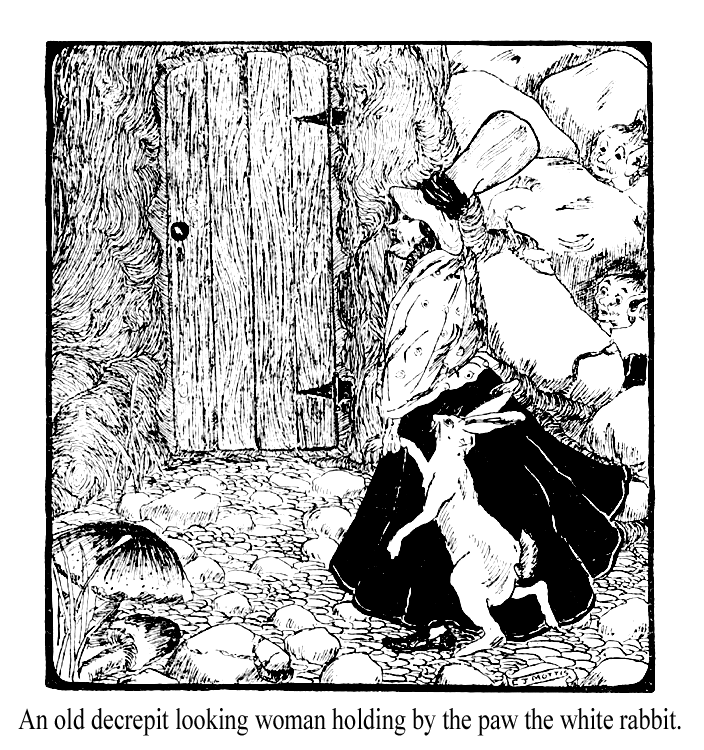
She went straight to the oak, and unlocked the door and entered. Quick as thought, Hip and Hop crept in with her. In the gloom it was impossible for her to see them, and the rabbit was nodding sleepily. Having locked the door, she shambled away.
“What luck we had to get in,” whispered Hop, as the two little gnomes set off down the passage.
In the dim light they could see the old woman hobbling along with the rabbit close behind her. Presently they came to the end of the passage, and saw that it branched off in two different ways. Seeing the witch already half way down one passage, they at once took the other.
Suddenly, as they went forward, Hop stumbled and fell, making no effort to rise; and Hip, rushing to his assistance, tumbled on top of him. They both fell so fast that they had no time to scream. Thump, thump, they had reached the ground at last. They lay there for some minutes too frightened to move, but at last, finding themselves unhurt, they grew braver, and looked about them. All around were great rocks and jagged pieces of granite, and they could easily see that they were underground, for above their heads were the roots of trees hanging down.
“Come, let us have a look round,” said Hip; “the ground is paved with little stones fitting closely together, so our journey will be easy.”
The path went on for some distance, getting narrower and narrower, till at last they had to go on their hands and knees; then the roof suddenly widened, and they found themselves in a large cave. Peering through the gloom, they saw the form of a maiden standing chained to a pillar of stone, whom they rightly judged to be the long lost Princess.
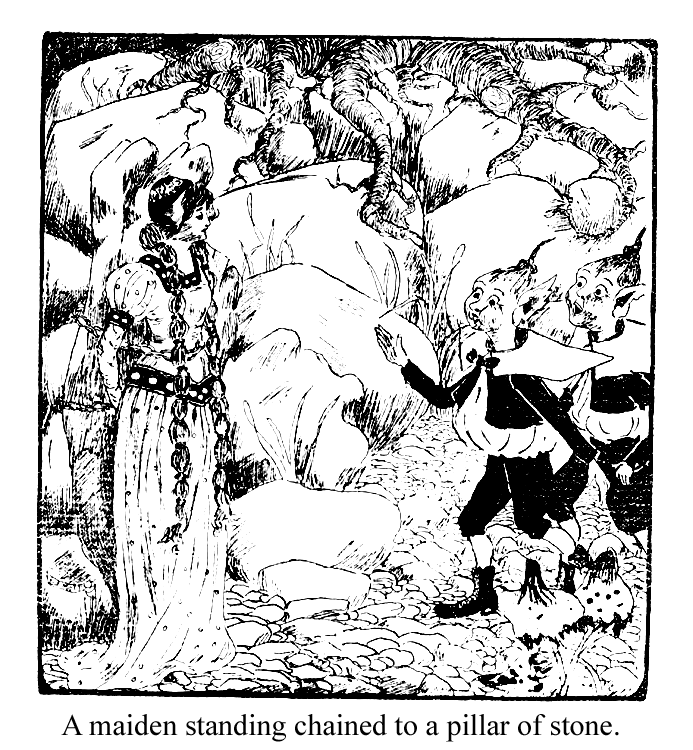
“Who are you?” she asked; “has the witch made two more prisoners?”
“No, no!” answered Hip; “we are two elves who have set out to look for the stolen Princess, and we think we will not have to search any more; for, unless we are very much mistaken, you are she, fair lady, and therefore we have come to rescue you and take you back to your own people.”
“Your news is good, indeed, and I am the long lost Princess, sirs,” she said. “See, the key of my fetters is under that stone.”
With some difficulty our heroes got the key, and soon the Princess was free. Full of gratitude, she put her arms around the two little elves and cried for joy.
“Now, tell me all about it,” she said, as she sat down between them. Having told her all, they asked what next should be done.
“Well,” said she, “the witch visits me once every seven days, and, as she came yesterday, I will not see her again for another week, so we must wait till to-night, when the witch mounts her broomstick, and sails away to see her sister, who lives in the back of the moon, and whom she visits every night. So, then, my dear little heroes, we will slip out of the door, and leave the witch for ever.”
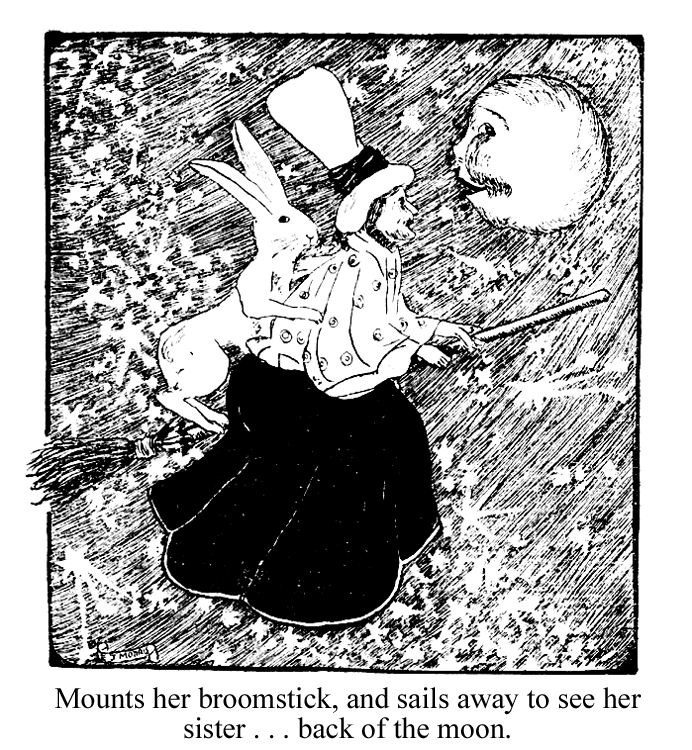
“Well, dear lady,” said Hop, “I propose to set out as soon as possible.”
“Then let us start at once,” answered the maiden, “for I have been here longer than I care about; however, we can get back quicker than you came; see, here is a door that has never been opened, and can only be unfastened by the person or persons who come here successfully to rescue me. Open it, my friends, for it will yield to your touch.”
The door being opened, there was revealed a steep flight of steps. On reaching the top, they found themselves in a narrow passage. Running quickly along, they came to the hole through which our heroes had fallen.
It was very large and quite impossible to get over. Here they stopped in consternation.
“Oh!” cried Hop, “what shall we do?”
“And just as we were getting on so well,” sobbed the Princess.
“Yes, you were doing pretty well, my friends.” The words seemed to come from their feet, and looking down, they saw a huge black spider, as large as a man’s head, watching them. They all started back in terror.
“It’s all right,” said the spider, “you have nothing to fear from me. I am the friend of all who need my help, and you will need it, I see.”
“I don’t think you will be able to help us,” they murmured, disconsolately.
“Don’t you?” answered the spider quietly; “wait and see.”
Then he took a great jump, landing on the other side of the hole, leaving across the cavity a fine silken thread; then he went backwards and forwards many times, and each time the web became thicker and thicker. Thus he toiled till, at last, there was a strong bridge of glistening web over the hole.
Cautiously our friends tried it, and finding it perfectly strong, they ran nimbly across and landed in safety on the other side.
“Oh! dear spider,” they cried, “we are so—” But the spider was nowhere to be seen.
“What a pity he is gone,” murmured the Princess, “I did so want to thank him.”
Walking quickly down the passage, they soon arrived at the door, but found, as they expected, that it was securely locked.
“Well, now we will wait till to-night, when the witch will mount her broomstick and fly to the moon,” said the Princess.
“Look!” cried Hop, “let us hide behind this boulder, and then, when the witch opens the door, we will be able to slip out.” Having settled themselves comfortably, they waited till evening. At last, in the darkness they heard a shuffling noise, which told them the witch was approaching.
She struck a match, and, finding the latch of the door, unlocked it; but, somehow, she dropped the key, and, as she was groping for it, the Princess and the gnomes slipped through the open door, and went out into the night.
They had not gone very far when suddenly they heard a rustling in the bushes, and our heroes’ beautiful forest friend of the day before stood before them.
Her delight at seeing the Princess was great. She clapped her hands, skipped about, and danced with Hip and Hop in turn, and then embraced the Princess, while Hip and Hop related their adventures.
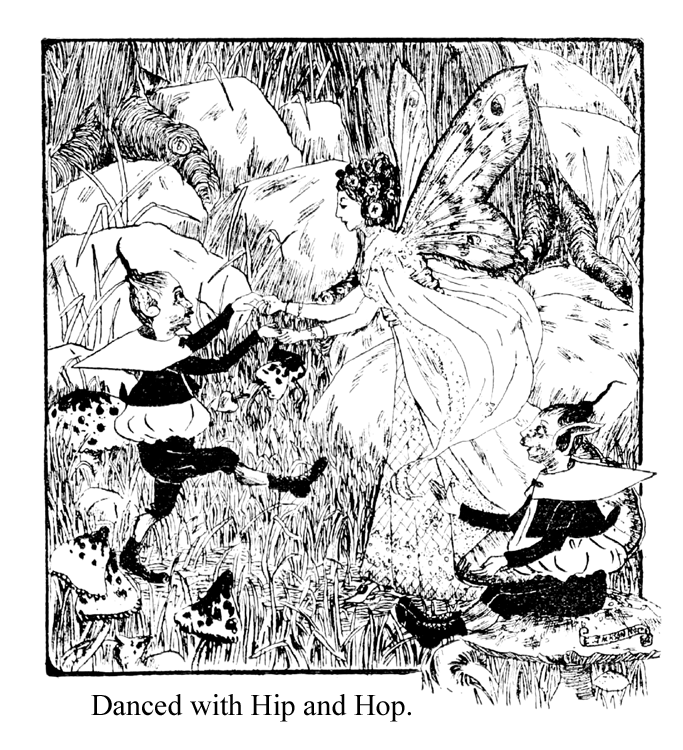
“And now,” said the Princess, when they had finished, “thanks to you, I am free, and I can return to my father’s palace.”
“Oh! Princess, there is no need to thank us, for we would do much more for you,” cried the two gnomes, “and we will always think of you, dear lady.”
“You darlings,” cried the Princess, who was getting quite gay at the prospect of going home, “I should like to marry you both, but as I cannot do that, promise me that you will come and be my pages. Now promise me—do.”
“Oh! yes, we promise, indeed we do,” cried they, dancing excitedly round her. “Three cheers for the Princess and our Forest Friend—Hurrah! hurrah! hurrah!”
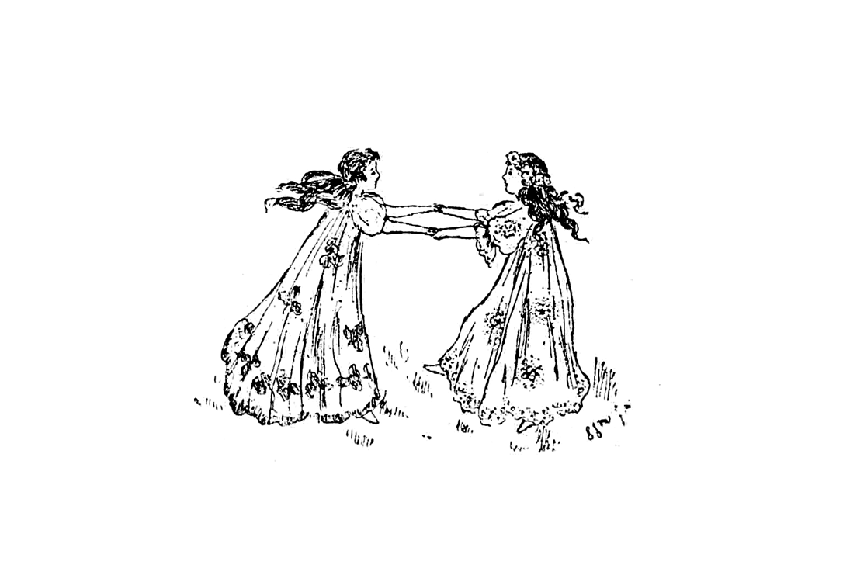
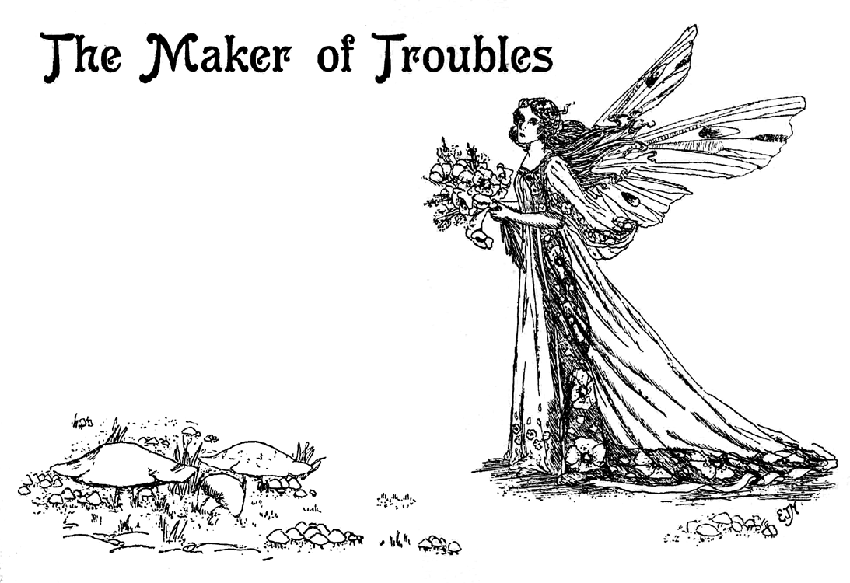
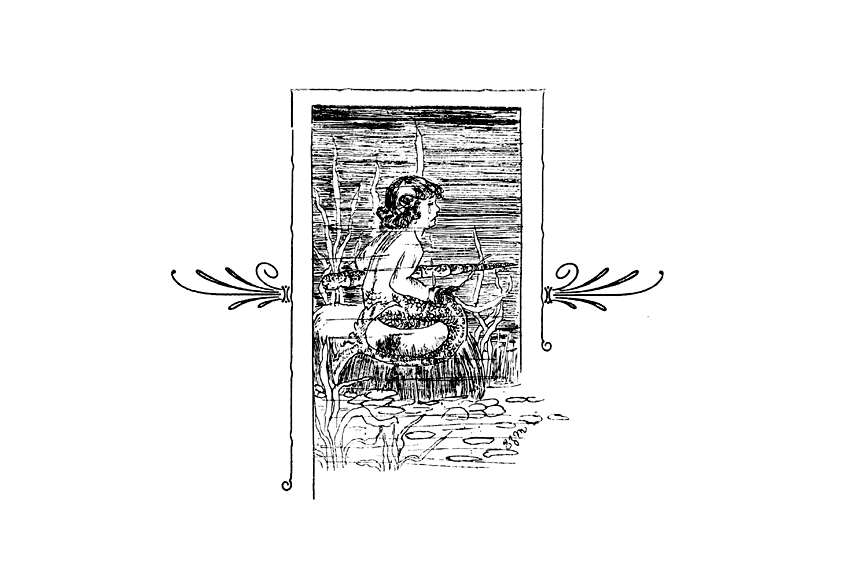
Far in the depths of a green wood lived an old gnome, and so wise was he that all the woodland sprites, the elves, the birds and the beasts went to him for advice.
Now, it happened that all the inhabitants of the wood were kept in a constant state of terror by a wicked dwarf, known by the name of “The Maker of Troubles.”
Everything that went wrong was arranged by him. If the cream refused to churn, you could thank him for it; if the fruit dropped off before it was ripe, he had a hand in it; if a little frightened elf lost himself in the wood, you may be sure that the dwarf had settled it carefully.
Well, one night, as the Wise Man of the Wood (for that was the name of the old gnome) was reading quietly under the shade of a large oak, with his little boy, Wonderkin, sitting opposite, one of the forest maidens came running up crying and ringing her hands in grief.
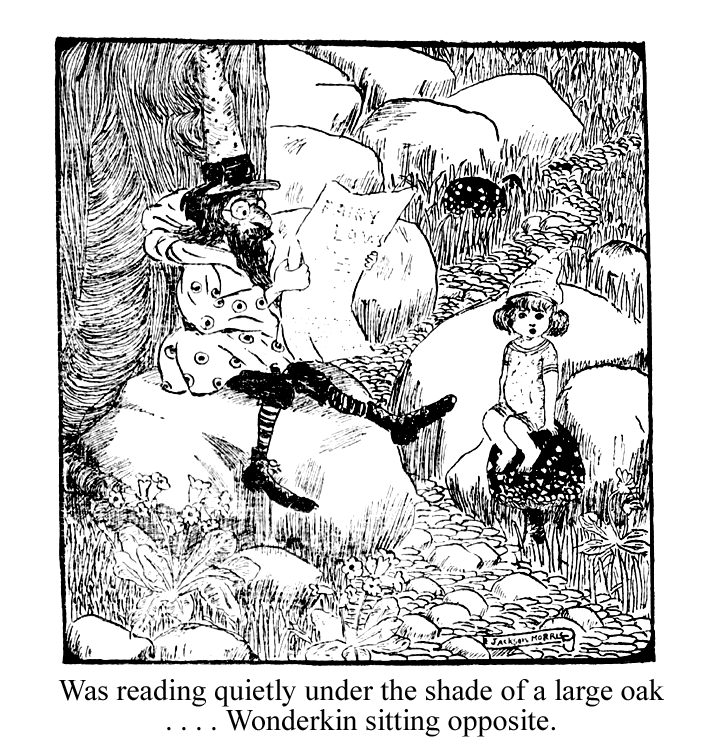
“O-oh,” she cried, “my youngest sister caught her foot in the chimney of the Maker of Troubles’ house, and fell right down under the earth, for he lives underground, you know? And, as I stood still in terror, I heard him say to her, as she fell thump on the floor, ‘Have you hurt yourself?’
“‘Yes,’ answered my sister, ‘very much.’
“‘Good!’ replied the old wretch. ‘I arranged that it should, and—’; but I did not hear any more, for I was so frightened that I rushed away to see you.”
“Well,” said the gnome, as she finished, “I will think it over; come back at this time to-morrow, and I will tell you my plan.”
“Very well,” replied the maiden, “I shall be here. Good-bye,” she called, as she ran up a mossy bank and disappeared from view.
At the appointed time the next day the maiden visited the gnome.
“Well,” said he in his gruff voice, “I have thought of a plan, a very good plan, too. The old dwarf has taken your sister far away to one of his unknown haunts, so the old owl told me this morning, and my plan is that you should go to the black pool, and wait there till the Maker of Troubles passes. As soon as he sees you he will at once seize you, and take you away to the place where he has hidden your sister. My little Wonderkin will, of course, follow you to find where he takes you, and then he will come back and tell me, and I will go at once and rescue you both. Now, what do you think of my plan?”
“Oh! I think it is splendid,” cried the maiden, skipping about and clapping her hands; “Wonderkin and I will go at once to the pool and wait till he comes.”
Arrived at the pool, the two sat down, Wonderkin hiding under a large mushroom, and the maiden sitting on the top.
At last the old dwarf came along, and, seeing the maiden, he immediately seized her and bound her hands behind her back, and fixed a heavy chain around her waist, and led her away. Wonderkin threw over himself a flimsy cloak that his father had made, which rendered him invisible, and hurried after them.
On and on they went. Now the track led down into a sunny valley, with fresh green grass and a sparkling stream. The air was full of sweet music from the throats of hundreds of bright birds that darted to and fro. Then suddenly one little bird, as he flew along was pounced upon by a large hawk and carried away.
“Good!” muttered the dwarf, “I arranged that carefully—I arrange everything carefully,” he said, turning to the maiden, who only looked proudly at him in answer.
The scenery began to grow wild and desolate. Huge rocks and boulders lay scattered around, and rugged cliffs towered upwards to the sky, and still the dwarf led the maiden on. At last, when suddenly turning the corner of a projecting rock, they came upon what looked like a huge yellow stone, which was the dwarf’s destination. When they came closer, Wonderkin noticed that it was a gigantic cheese set on end.
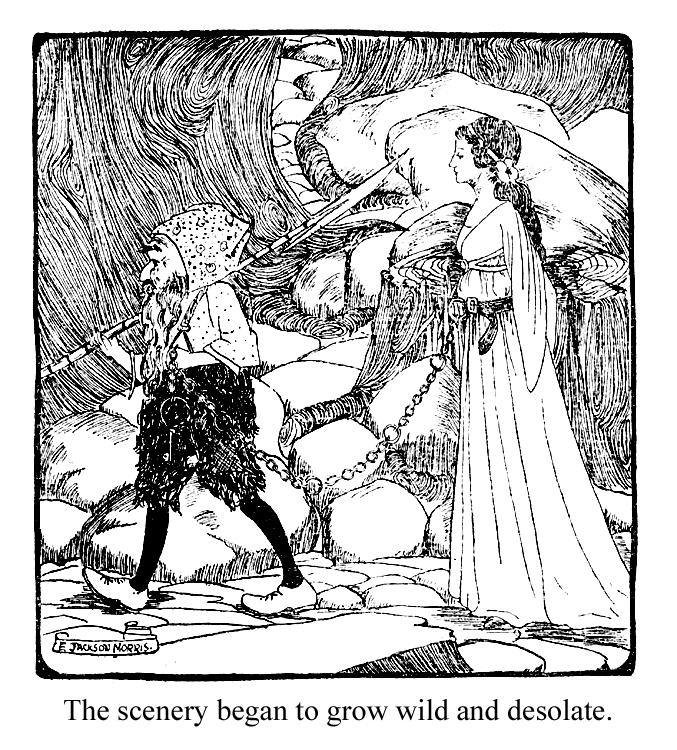
To this the dwarf led the maiden. Arrived at the great yellow mass he took off the maiden’s fetters, and opened a door in the side, and dragged her in with him. The poor prisoner felt terribly afraid as she was led inside the cheese, and placed in a dark room.
At last, as her eyes grew accustomed to the dark, she made out the form of her sister sitting dejectedly on the floor. Rushing to her, she embraced her tenderly, kissing her the while.
Here let us leave them, and follow Wonderkin, who, as soon as he saw the Maker of Troubles disappear into the cheese with the maiden, turned and set off homewards. Just as the daylight was dying away, he arrived at his home, and related to his father all that had happened.
“Well,” said the Wise Man, when he had finshed, “go and get my axe, for we must go and smash up his home.” Wonderkin having got the axe, they started away.
When they got to the dwarf’s house, they discovered him lying asleep just outside the door. The Wise Man was delighted when he saw this, for he had been longing to capture him.
He took out a large bottle from his pocket, and so huge was it that it was a mystery how it had got there. He then drew out the stopper, and a little puff of blue smoke curled upwards, floating away on the air. Then the Wise Man seized the dwarf, and stuffed him into the bottle, and, as the blue smoke was charmed, he grew smaller and smaller, till he fitted beautifully inside. Then the gnome put the stopper in the bottle and laid it down; and the dwarf, knowing nothing of this, slept on.
The Wise Man then cut a big hole in the back of the cheese. Having removed the piece of wall, father and son entered. There they saw the two sisters lying asleep on the floor. Little Wonderkin went forward and woke them up.
They all then went outside, and a strange sight met their view. The bottle in which the dwarf was entrapped was swaying from side to side, and the little man himself was springing up and down inside in a great rage, crying, “Let me out; let me out.”
“Ha! ha!” laughed the Wise Man, “you arranged your own capture very carefully indeed, didn’t you? ha! ha!” Despite his earnest entreaties to be let out, they carried him away to the gnome’s house, and there he was placed on a table and held up to ridicule.
The two maidens then went back to their home. When they arrived there they found their eldest sister in a great state of alarm. For, on returning the night before from a trip to the moon, she had found the house empty, and her sisters gone.
After relating their adventures, the three retired to rest.
The next day, they set off to have another look at the dwarf. How their eldest sister laughed when she saw him jumping up and down in the bottle, foaming with rage, and crying hoarsely: “Oh! let me out; let me out.”
The Wise Man then sent invitations to all the forest folk to come and see the Maker of Troubles, and hear how he was captured.
But that happened long, long ago, and the forest folk have never had any trouble since. The Maker of Troubles is still in the bottle, but has long since ceased to spring up and down, but sits quietly, gazing with sad eyes on any who came to look at him.
Perhaps he is thinking of his misdeeds, and all the muddles he has made, or, perhaps—but who can tell? I’m sure I cannot.
The forest grows more beautiful every day, and peace reigns over it, and if you penetrate into its heart at midnight, you would see three beautiful maidens dancing with a little boy.
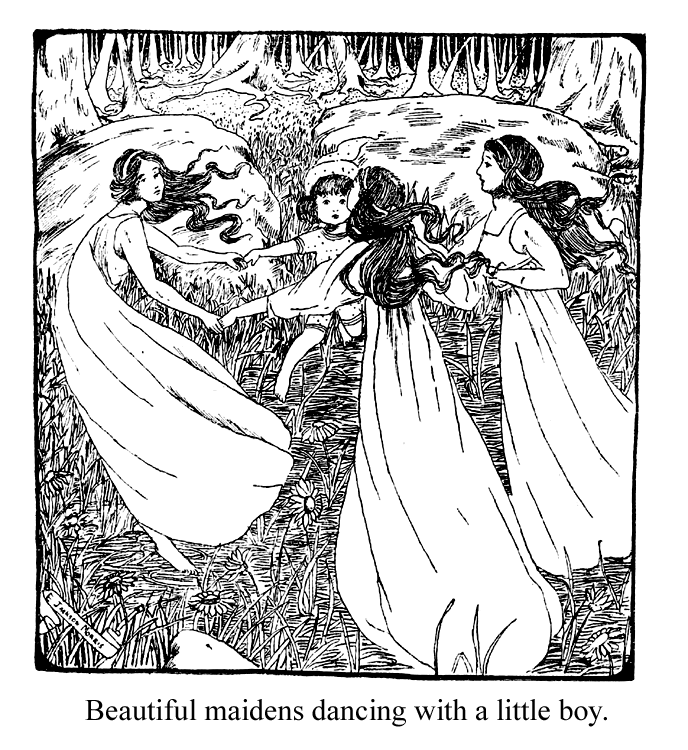
Of course, I need not tell you who they are; but, perhaps, you would be more satisfied if I did. They are the three forest sisters and little Wonderkin, the son of the Wise Man of the Wood, and—well, that’s the end of my story.

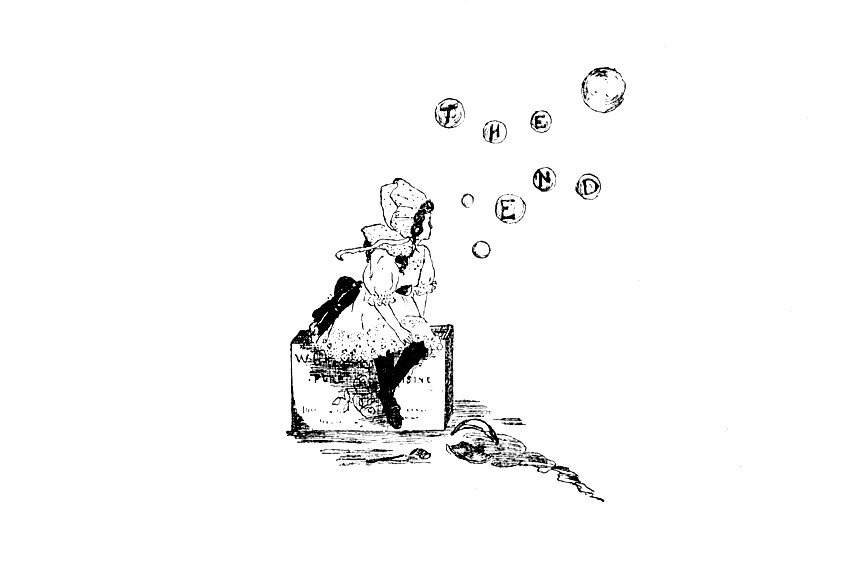

This site is full of FREE ebooks - Project Gutenberg Australia